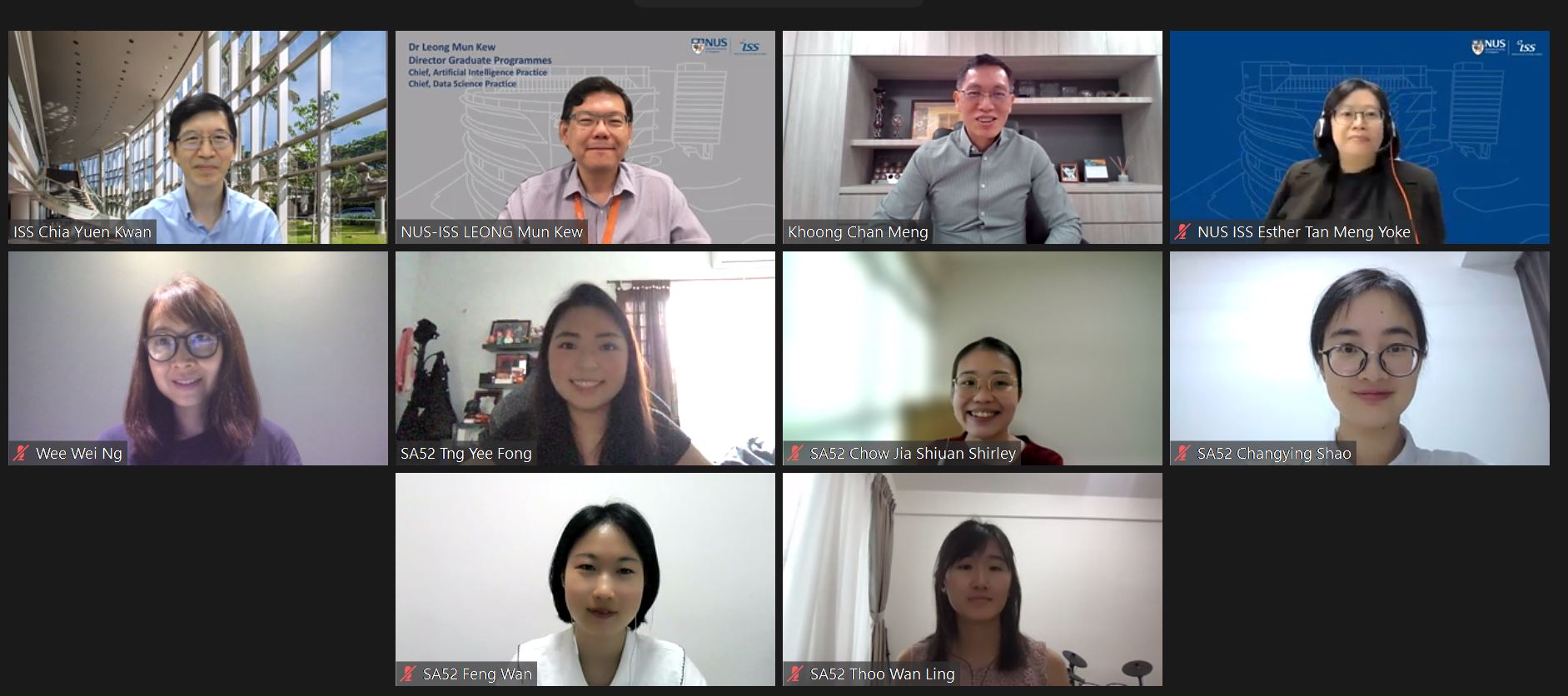Projects and internships provide opportunities for our Graduate Diploma in System Analysis (GDipSA) students to put into practice what they have learnt in the classroom and make ideas come to life in the real-world.
Bringing their ideas to fruition were students of the 52nd batch. This includes a rigorous five months internship experience that culminates in an Industrial Attachment Project Presentation for four outstanding projects and one crowned with the Accenture Prize.
Shares Ms Ng Wee Wei, Accenture's Country Managing Director, who was on the panel of judges, “It's an exciting time to be in consulting because there are real possibilities to make a difference and change the way businesses conduct themselves and really make an impact in society.”

The four SA52 teams at the Accenture Industrial Attachment Project Presentation with our panel of judges
Held on 11 April 2022, four teams shared their applications to their internship projects as they sought to drive this very transformation for their users - each of which spanning very different industries, from research, real estate and a government statutory board.
Diving into our students projects
First to share was Shao Changying and Feng Wan who worked on a logistics simulation system called O2DES and its development for the Creation of Warehouse Simulation Library at the NUS’ Centre of Excellence in Modelling and Simulation for Next Generation Ports. Their design made significant improvements to warehouse efficiency, maximising space utilisation and reducing costs.
As for Thoo Wanling, her internship experience took her to GovTech where she implemented hierarchical topics on the AskGov website. Her task was to introduce topics with more than one level in addition to making topics exclusive to each question and agency. She was also involved in regular engineering work such as fixing bugs, updating the user interface, and refactoring code. This resulted in an improvement of the organisation of information, user experience; giving agencies more autonomy in organising their information and introducing flexibility for future plans.
She was also involved in building the minimum viable product for PetitionsSG and this involved thinking through and implementing the database schema, implementing the front end designs, and adding backend logic - e.g. to view a petition, submit a petition. This will result in an improvement in communication between Singapore citizens and the government.
At LHT/SIMTech, Shirley Chow worked on improving an existing carbon emission calculator into an existing 3D pallet application, so that customers can find out how much carbon emissions are generated by their pallet products. Initially developed by LHT, the existing pallet application allows customers to build a 3D virtual pallet based on specifications like width, height, material and so forth. It also allows 2D blueprints to be generated, which speeds up the ordering process. After the calculator is implemented, customers can find out how much carbon emissions are generated throughout this pallet's lifetime.
Shirley improved on the carbon emission calculator and included options for different pallet materials, lifecycle assessment methods, modification of default settings, and improved the rendering of virtual pallets to resemble real life materials. The resulting application provides an easy and efficient way for customers to go onboard in reducing carbon emissions, speeds up the ordering process, generates an initial blueprint and generates potential cost savings on carbon emission taxes.
Real Estate Research Dashboard
After a thorough panel deliberation, it was Tng Yee Fong who ultimately emerged top in class for the Accenture Best Industrial Attachment Project. Her project was with Huttons, where she created a research dashboard to be used by agents as a marketing tool for them to aid them in their sales by presenting to their clients the trends in the property market. This research dashboard also provides graphs to help agents and their clients to better understand the property market through visualisation of the graphs.
The dashboard allows agents to better showcase their knowledge of the industry and to gain trust of their clients. The research team can also generate more detailed reports by utilising the insights from the graphical data.
While all four projects had shown the students' mettle to handle unpredictable challenges of user requirements, it was clear that their respective projects resulted in feasible IT solutions that came to life, to the satisfaction of users.
Own your transformation journey now. For more information on NUS-ISS' Graduate Diploma in Systems Analysis Programme, visit here.